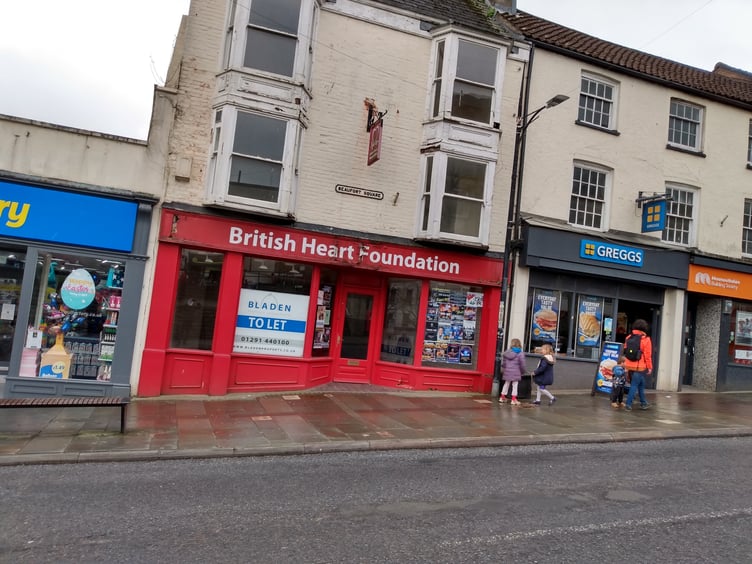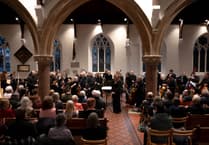SAT in an upstairs office of her ladies designer shoe shop, with her chocolate labrador at her feet, Else Newton has address stickers attached to every finger on her left hand and is stuffing envelopes with leaflets advertising “a fabulous new spring/summer collection”.
The mailing however isn’t only intended to promote her Scandia shop but implores her customers to, in capital letters, “SHOP LOCALLY…to keep our independent High Street shops open. The saying ‘Use us or Lose Us’ is not a fantasy but a fact” and lists neighbouring shops from Trim the Butcher to Toytastik Toys and every type of service from barbers to convenience stores.
It’s Ms Newton’s attempt to boost footfall in Chepstow, especially what she calls ‘High Town’ which is Moor Street, the continuation of the high street past the town gate, or ‘Arch’, the distinctive Grade I-listed castle-like tower, that traces its history back to the 13th century, wedged between town centre buildings.
Traders on either side of the Arch all agree that what Chepstow needs more of is footfall, the patter of potential customers pounding the streets, going shop to shop.
The Chamber of Commerce which represents businesses says issues facing Chepstow are “complex”, from high rents to difficulties recruiting, but its secretary Sue Kingdom, like many of the town’s shopkeepers, is wary of talking the town down. Many feel bruised by negative comments fueled either by a perception of a high number of empty units or the continued fall out from a temporary pedestrianisation.
The lack of people browsing is blamed for the number of empty stores, though there’s reassurance some will soon be occupied by new tenants, and which are seen as a further woe for retailers some who also bemoan a lack of variety among the retail offer, which along with a range of independents includes national chains WH Smith, Boots and Wilkos, and an abundance of coffee shops.
The town will soon be reduced to having just one bank, Lloyds, with HSBC set to follow Barclays in moving out. A sign in the window of the HSBC informs customers once it closes in June their nearest branch will be across the border and nearby Severn Bridge, 16 miles away in Bristol.
Traders however seem to accept bank closures as a reality of the modern high street and many have already adapted to using the Post Office for business needs instead.
The biggest vacancy in Chepstow’s retail centre is the space occupied for 140 years by the Herbert Lewis department store which closed in 2018 and “hit the town enormously,” according to Ms Newton.
The three-storey building, with a round clock hanging from an ornate wrought iron bracket at the first floor, dominates High Street and will soon to be brought back to life after five empty years. The ground floor has been split into three smaller retail units, with at least one understood to have been let, and the upper floors converted to flats.
The department store’s departure means Ms Newton is now one of the longest standing independent traders in the town, just beaten to the record by a month by Hannah’s Music which is on the opposite side of the road, having opened 32 years ago. Owner Carol Muttlow set up shop in 1991 “before the internet” when trading was “completely different”.
As well as running her shop that “sells anything musical”, Ms Muttlow promotes a concert series Castle Rock, which will feature Jason Donovan and Midge Ure among others at the town’s castle, this summer.
“I’ve been doing it 12 years and to try and bring people into Chepstow and a lot come from all over the world. I’ve just sent two tickets this morning to someone in Amsterdam and people will ask me about where they can stay so I also include information about campsites,” said Ms Muttlow.
Her efforts are praised by her neighbour, and fellow high street survivour, Ms Newton who employs three part-time staff and who would like to see both Monmouthshire County Council and Chepstow Town Council increase efforts to promote the town.
The county council says it will be working with the town council and chamber of commerce and local businesses to ensure “a vibrant and viable town centre”.
It is also working, with the town council, on a “placemaking plan” to identify regeneration priorities and wider projects which could open up the possibility of securing town centre funding from the Welsh Government.
The county council has already been awarded £1.1 million in grant funding, until 2025, for projects under £250,000 and says it will be contacting stakeholders to advise of opportunities to bid for funding for initiatives from pop-up shops, to trial new businesses, or to carry out internal or external refurbishment of buildings to bring them back into use. There is a separate regional fund for projects above £250,000.
Though much of the town’s appeal is based on its historic character, maintaining those buildings comes at a cost, which sometimes landlords seem either unwilling or unable to meet.
“Some landlords are not willing to do the work,” said Natalie Davies, who runs clothes shop Utopia Boutique on Moor Street and says she is aware of shops that have been forced to close due to the unwillingness of landlords to make repairs.
The clothes retailer was also a supporter of the pedestrianisation of High Street, from June 2020 to August last year, which was initially a response to the pandemic, but reversed following criticism. Some still cite the closure as having a knock-on effect on retail, and, as in many towns, car parking charges, which are increasing, are a common complaint.
Ms Davies said rates are also an issue for retailers and that rents in town can be between £800 to £1,600 a month. She would have liked the county council to have established its own rate relief scheme, as Newport did, to provide further assistance beyond discounts offered by the Welsh Government.
On the other side of the Arch, at St Mary’s Collectables – an Aladdin’s cave of antiques, jewellery and bric a brac – Dawn Floyd said rate relief is a much-needed assistance, though she doesn’t understand why some businesses are exempt completely.
“We have to pay the rates and other people don’t have to pay a penny,” complained Ms Floyd: “If we didn’t get the reduction the business rates would be up to £800 a month, but we have a 75 per cent reduction.
“But it’s the energy costs that have shocked me, and I’m coming up to pensionable age so I have to ask myself is it worth it?” said Ms Floyd who despite her concern at overheads said there is still “a lot of positivity” about Chepstow and she enjoys working in her shop, which she said often gives her the opportunity to use any number of the six European languages she speaks.
Language is a feature at one of the newer shops on High Street, Pig and Pip a craft centre which opened in November 2021.
Owner Hayley Miles, a Welsh speaker, also hosts sewing workshops and play and craft sessions for children, including with Welsh language promotion agency Menter Iaith Blaenau Gwent, Torfaen a Mynwy.
She thinks the main difference since the road re-opened is the noise from passing traffic and is hopeful that a coffee shop opening in a vacant clothing store opposite will mean more people looking in her window but also makes the effort to give customers a reason to visit.
“Things like the sessions with Menter Iaith bring people in,” said Ms Miles who, similar to the council’s proposal for pop up shops, rents space so other makers have the chance to sell their handmade items which also helps cover her rent.
“The cost to running the shop is about £1,000 a month before paying myself and with a reduction the rates are about £180 of that so it is quite heavy. It can be really busy on market days or during a festival but sometimes you won’t see anyone until 1pm and that can get quite disheartening.”
While rates and rents are costs faced by online competitors many of Chepstow’s retailers, like Pig and Pip, say the concentrate on providing what those trading online can’t.
Liz Amphlett, who runs Toytastik with her daughter, said the shop that has been open for eight years has built a customer base which means it isn’t reliant on passing trade. She said: “If we were we probably wouldn’t be as fortunate as we are as footfall in Chepstow has definitely declined since before the pandemic, probably when Herbert Lewis closed.”
Daughter Olivia said they are happy to be a simple destination for people struggling with the cost-of-living who now may visit town for one of its many coffee shops as an affordable luxury: “We have people coming in, and not spending a lot, as it’s a nice little outing and we’re very happy for them to come in and just do that.”
At St Mary’s Street bookseller Matt Taylor, who has run Chepstow Books and Gifts for 18 years with the business having operated for 40 years, said the “serendipity of just coming in and browsing for a book” along with the customer service offered by him and is three part-time staff, is how he can compete with online retail, while his shop has also hosted events with authors including Sir David Attenborough and comedian Michael McIntyre.
The attraction of high street retail is what persuaded Ian Crosby to open two shops next door to each other on Beaufort Square. For five days of the seven he works Mr Crosby, who opened his first record shop when he was 17 in Penarth, near Cardiff, bases himself in his Chepstow Records Shop while a sign in the door of his Tortoise Shop directs anyone wishing to buy, or ask about, reptiles to the record shop.
“I missed the retail side so decided to open the Tortoise Shop,” said Mr Crosby who had closed the last of his previous chain of garden tortoise shops in 2005: “I had no intention whatsoever of opening what has now become Chepstow Records but this unit was also available and I thought I could throw a few records in there and it has been so successful I’m opening another next month down in Torquay.”
While retailing in Chepstow faces its challenges its ability to thrive is likely to depend on those able to take advantage of the surprises thrown up as well as well as placemaking strategies.




Comments
This article has no comments yet. Be the first to leave a comment.